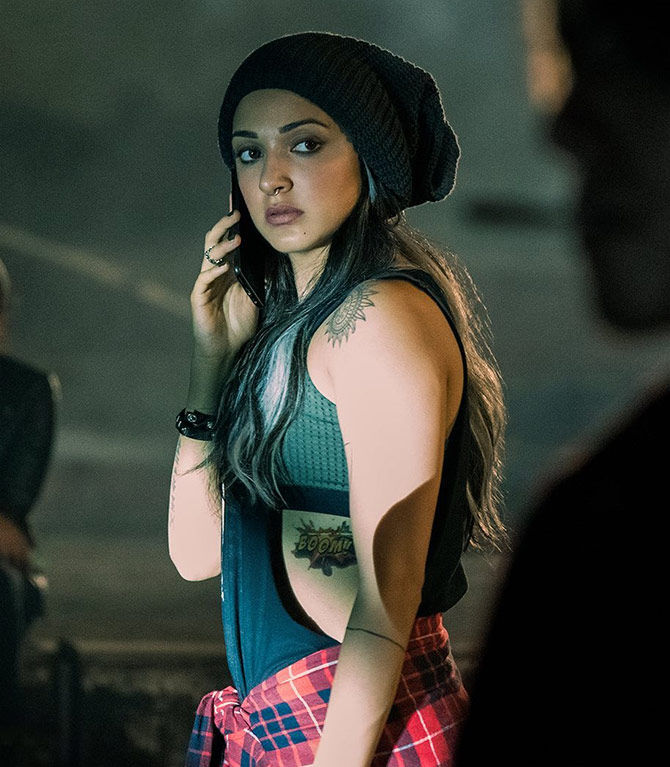‘Nobody can put back and seal what the movement has unleashed — conversation, awareness and support.’
IMAGE: Kiara Advani in Guilty. Photograph: Kind courtesy Netflix/Instagram
Ruchi Narain, known as the writer of Sudhir Mishra’s brilliant Hazaaron Khwaishein Aisi,, directed Chitrangda Singh in Kal: Yesterday and Tomorrow.
She has now directed the Netflix film Guilty, starring Kiara Advani, Akansha Ranjan Kapoor, Taher Shabbir and Gurfateh Singh Pirzada, produced by Karan Johar’s Dharmatics.
“When Karan Johar told me that he suspected that male stars did not want to work with me because I was a woman, despite all his persuasion, something snapped in me,” Ruchi tells Subhash K Jha.
Guilty and its interpretation of the patriarchal adage ‘She asked for it’ reminded me of Jonathan Kaplan’s Accused. Was that a reference point for you?
I wanted to make Guilty, as I had reached a breaking point in my personal experience with misogyny and patriarchy.
I had won a Filmfare and other awards for Hazaaron Khwahishein Aisi, and had made another film which was appreciated and showed clearly I had a command on the craft.
But both were made outside the ‘industry’.
I just couldn’t get my next film made from within the industry… that too with the most powerful producer in India!
What do you mean?
When Karan Johar told me that he suspected that male stars did not want to work with me because I was a woman, despite all his persuasion, something snapped in me.
I came back and told Karan the next day that I no longer wanted to do that film, but I wanted to write and make a new one which took on the injustice of unequal opportunities and that is patriarchy!
This was in 2012.
The #MeToo movement has spawned interesting and powerful debates. How much of the rhetorics on the topic have influenced your film?
Again, as an ambitious working film-maker, all topics that have been discussed are actually a part of my everyday experience.
When #MeToo broke in India, I felt liberated because for the first time, women across the board started speaking up… not just about harassment and abuse, but just the discrimination that we face on a daily basis.
This reignited the fire in me to attempt to make Guilty again.
As Kanika (Dhillon), my co-writer, was busy at the time, I wrote a new draft of the film in a post #MeToo world and called Karan.
He needed no convincing at all, as he felt it was the perfect film to become Dharmatic Entertainment’s Production number one with Netflix.
IMAGE: A scene from Kal Yesterday & Tomorrow.
You made Kal Yesterday & Tomorrow in 2005. What took you so long to put together your second feature, not counting your animation film last year? Have you encountered discrimination or harassment in the film industry?
You’ve hit the nail on its head.
What made you pick Kiara Advani and debutante Akansha Ranjan for the main parts? How tough was it for you to get them to understand the complexities of the situation?
When we were discussing casting, Karan brought up Kiara’s name as he has worked with her in Lust Stories and vouched for her talent as an actor.
I immediately went for the suggestion as Kiara gives off a very sincere energy, which I felt would make it believable for the character of Nanki… who tries to uncover the truth despite being convinced about her boyfriend’s story.
She also has a gentleness which I felt would add to the fact that Nanki is always wearing a mask.
And Kiara Advani?
Kiara is a very intelligent and sensitive person. She worked very hard in prepping and surrendered to all my processes though they were alien to her.
She recognised the challenge and her gut reaction was to dive right in.
By the time I was editing, I felt aside from me, the other person who really understood what I was trying to put across was Kiara, so I ended up using her as my bouncing board.
Akansha was extremely hard-working also and prepped with a language coach for months.
The hardest part of playing Tanu was for her not to judge her.
I told her that everyone thinks Tanu is a gold digger, but in her mind that can never be because she thinks SHE is the gold!
Akansha wrote that on the front page of her script.
IMAGE: Ruchi Narain.
Your film is about a seduction act turning into rape. Where does consent and coercion begin? What is your take on this?
I think my take is very clear in the film.
Two willing parties make for consent.
When force, coercion, intimidation and fear come into play, the balance tips and it is then abuse.
While I am completely empathetic to your concerns regarding sexual violation, I found no representation of the male perception in your film. Are you aware of how many men are wrongly accused of rape or are rape victims themselves? I am all for MeToo, but what about MenToo?
I am well aware of this.
Unfortunately, the number of male victims is minuscule in comparison.
Aside from statistics, I can say with conviction that every girl in India has faced some kind of sexual abuse or harassment. That is not the case for men.
Also, when there is such severe injustice on one side, some people decide to deal with it using unjust ways.
Though I don’t condone that, I understand it.
Your film very rightly ends with a sardonic comment that the MeToo accused have gone back to work. In your opinion, how effective has the movement been?
I feel the real success of the movement has been in liberating the conversations that surround the unequal treatment of women.
Because of this, I feel the only way is up.
Nobody can put back and seal what the movement has unleashed — conversation, awareness and support.
Punishment has not followed, but that is a function of institutionalised patriarchy in the system… and the system is loaded.
In the entertainment industry, the really big offenders remain untouched. A lot of money has been used to silence them. Are you aware of this?
We all are. And we remain silent.
As a woman in the film industry, do you feel safer now than you did earlier before the MeToo movement?
100 per cent. Because now, women talk to each other about it. And there are just too many of us.
What are you directing next?
A Web series called Hundred which will be out very soon.




